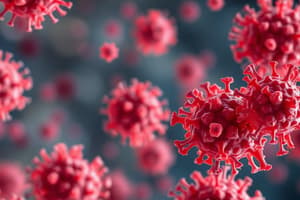Podcast
Questions and Answers
What does Adaptive Immunity include?
What does Adaptive Immunity include?
- Antigen Presentation
- MHC Molecules
- Both A and B (correct)
- None of the above
What is antigen presentation?
What is antigen presentation?
Display of an antigen on a cell's plasma membrane
What does antigen presentation help T-lymphocytes see?
What does antigen presentation help T-lymphocytes see?
The antigen
What are the two categories of cells that present antigens to T-lymphocytes?
What are the two categories of cells that present antigens to T-lymphocytes?
What are antigen-presenting cells (APCs)?
What are antigen-presenting cells (APCs)?
Name three examples of APCs.
Name three examples of APCs.
Antigen presentation requires _______ __________ of __________ to ________ protein.
Antigen presentation requires _______ __________ of __________ to ________ protein.
What is termed MHC?
What is termed MHC?
What does MHC stand for?
What does MHC stand for?
What are the two major categories of MHC and where are they found?
What are the two major categories of MHC and where are they found?
Group of ______ _______ for MHC molecules in ______ _______.
Group of ______ _______ for MHC molecules in ______ _______.
What are MHC class I molecules?
What are MHC class I molecules?
MHC class I molecules normally ______ randomly selected -_ on _____ ________.
MHC class I molecules normally ______ randomly selected -_ on _____ ________.
What does MHC class I display that is ignored by immune system cells?
What does MHC class I display that is ignored by immune system cells?
During infection, what do MHC class I molecules present?
During infection, what do MHC class I molecules present?
Which type of MHC class molecules is found on all nucleated cells?
Which type of MHC class molecules is found on all nucleated cells?
During infection, MHC class I provides means for _______ with ______ ___-lymphocytes as ______ _______ are presented.
During infection, MHC class I provides means for _______ with ______ ___-lymphocytes as ______ _______ are presented.
Proteins of ____ particles (or other microbes) are digested by ______ into _____ fragments; _______ fragments are taken up into the _____.
Proteins of ____ particles (or other microbes) are digested by ______ into _____ fragments; _______ fragments are taken up into the _____.
Where are MHC class I molecules synthesized?
Where are MHC class I molecules synthesized?
What could become attached to MHC class I molecules during formation that would lead to unhealthy cells?
What could become attached to MHC class I molecules during formation that would lead to unhealthy cells?
T_ _ _ _ _ _ v_ _ _ _ _ _ _ are produced from the _____ that contain MHC class I molecules with ____ peptide _______ which are shipped by the ______ ______ through the ______ _______ to the _____ ______.
T_ _ _ _ _ _ v_ _ _ _ _ _ _ are produced from the _____ that contain MHC class I molecules with ____ peptide _______ which are shipped by the ______ ______ through the ______ _______ to the _____ ______.
Which type of MHC class molecules is used to communicate with cytotoxic T-lymphocytes?
Which type of MHC class molecules is used to communicate with cytotoxic T-lymphocytes?
MHC class I molecules with bound foreign _____ are d_____ within the plasma membrane following f_____ of the secretory v______ with the _____ membrane.
MHC class I molecules with bound foreign _____ are d_____ within the plasma membrane following f_____ of the secretory v______ with the _____ membrane.
How does MHC class I bounded with foreign antigen get into the plasma membrane?
How does MHC class I bounded with foreign antigen get into the plasma membrane?
CD8 interacts specifically with MHC class __ molecules.
CD8 interacts specifically with MHC class __ molecules.
Flashcards are hidden until you start studying
Study Notes
Adaptive Immunity
- Adaptive immunity involves antigen presentation and Major Histocompatibility Complex (MHC) molecules.
- Essential for the immune system to respond to specific pathogens.
Antigen Presentation
- Antigen presentation occurs when an antigen is displayed on a cell's plasma membrane.
- This process is crucial for T-lymphocytes to recognize and respond to the antigen.
Types of Antigen Presenting Cells (APCs)
- All nucleated cells and specialized antigen-presenting cells (APCs) present antigens to T-lymphocytes.
- APCs include dendritic cells, macrophages, and B-lymphocytes.
Mechanism of Antigen Presentation
- Requires the physical attachment of antigens to transmembrane proteins.
- MHC molecules are the transmembrane proteins crucial for antigen attachment.
MHC Classifications
- Two major MHC categories: MHC Class I (found on all nucleated cells) and MHC Class II (found on APCs and also MHC Class I).
- MHC molecules are coded by a group of genes in plasma membranes.
MHC Class I Characteristics
- MHC Class I molecules are unique glycoproteins determined genetically.
- They present randomly selected self-antigens, typically ignored by immune cells.
Role of MHC During Infection
- MHC Class I presents foreign antigens during infections, enabling communication with cytotoxic T-lymphocytes.
- Proteins from viral particles are digested into peptide fragments, which are then processed by the rough endoplasmic reticulum (RER).
Synthesis and Transport of MHC Class I
- MHC Class I molecules are synthesized in the RER.
- Foreign peptide fragments attach to MHC Class I during synthesis, indicating unhealthy cells.
Transport Vesicles
- Transport vesicles from the RER contain MHC Class I with bound viral peptides and are processed through the endomembrane system and Golgi apparatus to reach the plasma membrane.
Fusion and Display
- MHC Class I molecules with foreign antigens are displayed on the plasma membrane after fusion of secretory vesicles.
- This process allows for the recognition of infected cells by cytotoxic T-lymphocytes.
CD8 Interaction
- CD8 specifically interacts with MHC Class I molecules, facilitating the immune response against infected or abnormal cells.
Studying That Suits You
Use AI to generate personalized quizzes and flashcards to suit your learning preferences.




